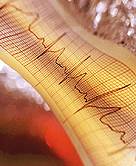- 7 Best Breads for Maintaining Stable Blood Sugar
- Gelatin vs. Collagen: Which is Best for Skin, Nails, and Joints?
- The Long-Term Effects of Daily Turmeric Supplements on Liver Health
- Could Your Grocery Store Meat Be Causing Recurring UTIs?
- Are You Making This Expensive Thermostat Error This Winter?
- Recognizing the Signs of Hypothyroidism
- 10 Strategies to Overcome Insomnia
- Could Artificial Sweeteners Be Aging the Brain Faster?
- Techniques for Soothing Your Nervous System
- Does the Water in Your House Smell Funny? Here’s Why
New Diabetes Drug Seems Safe for Heart, Study Finds


MONDAY, Sept. 2The new diabetes drug Onglyza has no effect, good or bad, on a patient’s risk for heart attacks, a new study finds. However, the researchers from Brigham and Women’s Hospital in Boston did find a surprising rise in hospitalizations for heart failure among those who took the medication compared to those who did not.
The findings should “guide physicians and improve their ability to prescribe different diabetes drugs in a more evidence-based and data-driven way,” study co-principal investigator Dr. Deepak Bhatt, of Brigham and Women’s and Harvard Medical School, said in a hospital news release.
The study was funded by the drug’s makers, AstraZeneca and Bristol-Myers Squibb, and is published online Sept. 2 in the New England Journal of Medicine, to coincide with its presentation at the annual meeting of the European Society of Cardiology in Amsterdam.
Issues around the safety profiles of newer diabetes drugs gained prominence recently after one blockbuster medication, Avandia, was all but pulled from the market in 2010 due to safety concerns. In a journal editorial accompanying the new study, experts noted that after Avandia gained U.S. Food and Drug Administration approval in 1999, “a highly publicized meta-analysis in 2007 reported a 43 percent increase in [heart attacks] and a 64 percent increase in death from cardiovascular causes” tied to use of the drug.
The editorialists say the Avandia experience led the FDA to be highly cautious in its oversight of new diabetes medications, and in 2008 the agency issued a new Guidance for Industry mandating that “preapproval and postapproval studies for all new antidiabetic drugs rule out excess cardiovascular risk.”
The new trial into the safety of Onglyza (saxagliptin) is in keeping with the new guidelines. The large, international study involved nearly 16,500 patients with type 2 diabetes from 26 countries.
The participants, who also had risk factors for heart disease, were given either saxagliptin at 5 milligrams per day (or 2.5 mg daily in patients with reduced kidney function), or a dummy pill with no active ingredients. The patients did not know if they were taking the medication or the placebo pill.
Over the course of more than two years, the researchers found the patients who took the diabetes drug were at no greater risk for a heart attack than those who took the dummy pill.
The study showed that cardiovascular death, heart attack, stroke, or hospitalization for unstable angina, coronary revascularization (angioplasty), or heart failure occurred in about 12.8 percent of patients who took the drug, compared to 12.4 percent of those in the placebo group — not a significant difference.
However, “our data also show an increase in hospitalization for heart failure in patients who received saxagliptin, which was not expected and deserves further study,” the study chairman, Dr. Eugene Braunwald of the TIMI Study Group, cardiovascular division at Brigham and Women’s and Harvard Medical School, said in the hospital news release.
But the drug had real benefits, as well. “Patients who received saxagliptin also had better control of blood sugar levels and a reduced need for insulin therapy,” noted the study’s co-principal investigator, Dr. Itamar Raz, of Hadassah Medical Center, Israel.
Raz added that the diabetes drug also prevented the progression of microalbuminuria, a condition that occurs when a type of protein called albumin is spilling into the urine due to kidney damage.
Two diabetes experts unconnected to the study said the findings should help ease the minds of patients and physicians.
“The treatment of patients with diabetes has been challenging in recent years,” said Dr. Sripal Bangalore, director of research in the cardiac catheterization laboratory at NYU Langone Medical Center, New York City. “It is reassuring to see a mega trial . . . re-assuring the cardiovascular safety of saxagliptin given for a median of two years,” he added.
“The pessimistic way of looking at this is that the drug was no better than placebo [in reducing heart risks] and had higher risk of heart failure and hypoglycemic events,” Bangalore said. “Hopefully, the investigators will publish more data from the trial showing improvement in microvascular events.”
Dr. Tara Narula is associate director of the cardiac care unit at Lenox Hill Hospital in New York City. She agreed that “there currently exists a tremendous amount of confusion regarding which diabetes drugs are safe to use in patients at risk for or with established cardiovascular disease.”
She said the new trial has it upside and downside. “The results are truly noteworthy in that patients taking saxagliptin had significantly improved rates of blood sugar control, less microalbuminuria and no evidence of increased or decreased rates of ischemic [vessel blockage] events,” Narula said. “However, the study median duration was only two years and a longer time of drug therapy or longer follow-up may be required to reveal any real signal of improvement or exacerbation of cardiovascular outcomes.”
Another study, also presented Monday at the European heart meeting and published in the New England Journal of Medicine, looked at the safety profile of Nesina (alogliptin), another newly FDA-approved diabetes drug.
The study, which was funded by the drug’s maker, Takeda, involved nearly 5,400 patients with type 2 diabetes and a history of heart events (heart attack or angina requiring hospitalization). Patients received either Nesina or a placebo and were followed for an average of 18 months.
The researchers, led by Dr. William White of the University of Connecticut School of Medicine, said they found no increase in cardiovascular events for those using Nesina compared to those on a placebo.
More information
The American Diabetes Association provides more information on diabetes medicine.
Source: HealthDay
Copyright © 2026 HealthDay. All rights reserved.










